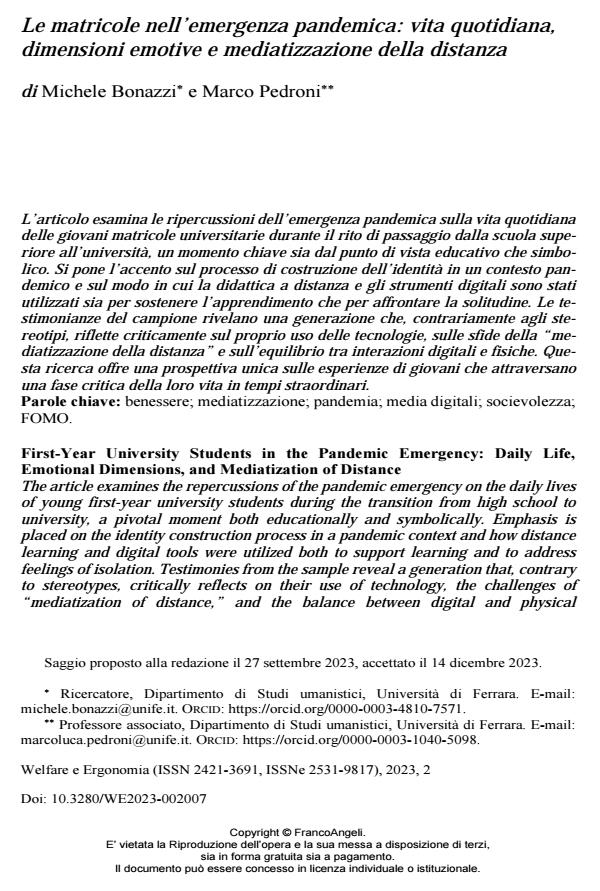First-Year University Students in the Pandemic Emergency: Daily Life, Emotional Dimensions, and Mediatization of Distance
Journal title WELFARE E ERGONOMIA
Author/s Michele Bonazzi, Marco Pedroni
Publishing Year 2024 Issue 2023/2 Language Italian
Pages 15 P. 87-101 File size 223 KB
DOI 10.3280/WE2023-002007
DOI is like a bar code for intellectual property: to have more infomation
click here
Below, you can see the article first page
If you want to buy this article in PDF format, you can do it, following the instructions to buy download credits

FrancoAngeli is member of Publishers International Linking Association, Inc (PILA), a not-for-profit association which run the CrossRef service enabling links to and from online scholarly content.
The article examines the repercussions of the pandemic emergency on the daily lives of young first-year university students during the transition from high school to university, a pivotal moment both educationally and symbolically. Emphasis is placed on the identity construction process in a pandemic context and how distance learning and digital tools were utilized both to support learning and to address feelings of isolation. Testimonies from the sample reveal a generation that, contrary to stereotypes, critically reflects on their use of technology, the challenges of “mediatization of distance,” and the balance between digital and physical interactions. This research offers a unique perspective on the experiences of youth navigating a critical phase of their lives during extraordinary times.
Keywords: well-being; mediatization; pandemic; digital media; sociability; FOMO.
- Al-Maskari A., Al-Riyami T. and Kunjumuhammed S.K. (2022). Students academic and social concerns during COVID-19 pandemic. Education and information technologies, 27(1): 1-21.
- Al-Oraibi A., Fothergill L., Yildirim M., Knight, H., et al. (2022). Exploring the Psychological Impacts of COVID-19 Social Restrictions on International University Students: A Qualitative Study. International journal of environmental research and public health, 19(13), 7631.
- Balzola A. (2020). L’educazione a distanza alla luce e all’ombra della pandemia. Mediascapes journal, 15: 203-210.
- Benítez-Andrades J.A., Fernández-Villa T., Benavides C. et al. (2021). A case study of university student networks and the COVID-19 pandemic using a social network analysis approach in halls of residence. Sci Rep, 11, 14877.
- Bonini T. (2020). L’immaginazione sociologica e le conseguenze sociali del Covid-19. Mediascapes journal, 15: 13-23.
- Browning M.H.E.M., Larson L.R., Sharaievska I. et al. (2021). Psychological impacts from COVID-19 among university students: Risk factors across seven states in the United States. PloS one, 16(1), e0245327.
- Caliandro A., Anselmi G. and Sturiale V. (2020). Fake news, Covid-19 e Infodemia: un esempio di ricerca sociale in real-time su Twitter. Mediascapes Journal, 15: 174-188.
- Duan L. and Zhu G. (2020). Psychological interventions for people affected by the COVID-19 epidemic. Lancet Psychiatry, 7(4): 300-302.
- Galimberti U. (2020). Umberto Galimberti sul coronavirus. -- Testo disponibile al sito: https://www.feltrinellieditore.it/news/2020/02/28/umberto-galimberti-sul-coronavirus/, ultima consultazione il 10 giugno 2023.
- Gómez-García G., Ramos-Navas-Parejo M., de la Cruz-Campos J.C. and Rodríguez-Jiménez C. (2022). Impact of COVID-19 on University Students: An Analysis of Its Influence on Psychological and Academic Factors. International journal of environmental research and public health, 19(16), 10433.
- Heidegger M. (2014). Essere e tempo. Milano: Longanesi.
- Lombi L. (2015). Le web survey. Milano: FrancoAngeli.
- Lundström M. (2022). Young in pandemic times: a scoping review of COVID-19 social impacts on youth, International Journal of Adolescence and Youth, 27(1): 432-443.
- Lupton D. (2020). Social Research for a COVID and Post-COVID World: An Initial Agenda. -- Testo disponibile al sito: https://medium.com/@deborahalupton/social-research-for-a-covid-and-post-covid-world-an-initial-agenda-796868f1fb0e, ultima consultazione il 4 aprile 2023.
- Mauss M. (2002). Saggio sul dono. Torino: Einaudi.
- Parmiggiani P. (1997). Consumo e identità nella società contemporanea. Milano: FrancoAngeli.
- Pedroni M. (2020). Narrazioni virali. Decostruire (e ricostruire) il racconto dell’emergenza coronavirus. Mediascapes Journal, 15: 24-43.
- Sartre J.P. (1988). L’essere e il nulla. Milano: Il Saggiatore.
- Senter M.S. (2023). The Impact of Social Relationships on College Student Learning during the Pandemic: Implications for Sociologists. Teaching Sociology, DOI: 10.1177/0092055X231178505.
- Simmel G. (1997). La socievolezza. Roma: Armando.
- Turkle S. (2015). La conversazione necessaria. La forza del dialogo nell’era digitale. Torino: Einaudi.
- Van Gennep A. (1981). I riti di passaggio. Torino: Bollati Boringhieri.
Michele Bonazzi, Marco Pedroni, Le matricole nell’emergenza pandemica: vita quotidiana, dimensioni emotive e mediatizzazione della distanza in "WELFARE E ERGONOMIA" 2/2023, pp 87-101, DOI: 10.3280/WE2023-002007